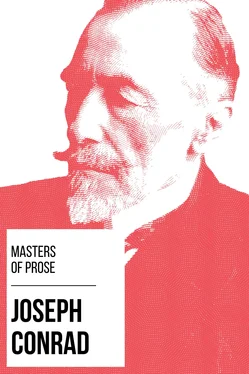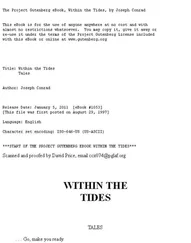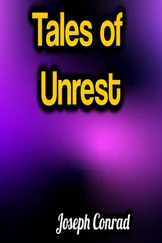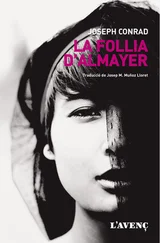The terms of the lease were very advantageous, but the retired situation of the village and a plain, comfortable house in good repair were, I fancy, the greatest inducements. He lived there quietly for about ten years, seeing very few people and taking no part in the public life of the province, such as it could be under an arbitrary bureaucratic tyranny. His character and his patriotism were above suspicion; but the organizers of the rising in their frequent journeys up and down the province scrupulously avoided coming near his house. It was generally felt that the repose of the old man's last years ought not to be disturbed. Even such intimates as my paternal grandfather, comrade-in-arms during Napoleon's Moscow campaign, and later on a fellow officer in the Polish army, refrained from visiting his crony as the date of the outbreak approached. My paternal grandfather's two sons and his only daughter were all deeply involved in the revolutionary work; he himself was of that type of Polish squire whose only ideal of patriotic action was to “get into the saddle and drive them out.” But even he agreed that “dear Nicholas must not be worried.” All this considerate caution on the part of friends, both conspirators and others, did not prevent Mr. Nicholas B. being made to feel the misfortunes of that ill-omened year.
Less than forty-eight hours after the beginning of the rebellion in that part of the country, a squadron of scouting Cossacks passed through the village and invaded the homestead. Most of them remained, formed between the house and the stables, while several, dismounting, ransacked the various outbuildings. The officer in command, accompanied by two men, walked up to the front door. All the blinds on that side were down. The officer told the servant who received him that he wanted to see his master. He was answered that the master was away from home, which was perfectly true.
I follow here the tale as told afterward by the servant to my granduncle's friends and relatives, and as I have heard it repeated.
On receiving this answer the Cossack officer, who had been standing in the porch, stepped into the house.
“Where is the master gone, then?”
“Our master went to J——” (the government town some fifty miles off) “the day before yesterday.”
“There are only two horses in the stables. Where are the others?”
“Our master always travels with his own horses” (meaning: not by post). “He will be away a week or more. He was pleased to mention to me that he had to attend to some business in the Civil Court.”
While the servant was speaking the officer looked about the hall.
There was a door facing him, a door to the right, and a door to the left. The officer chose to enter the room on the left, and ordered the blinds to be pulled up. It was Mr. Nicholas B.'s study, with a couple of tall bookcases, some pictures on the walls, and so on. Besides the big centre-table, with books and papers, there was a quite small writing-table, with several drawers, standing between the door and the window in a good light; and at this table my granduncle usually sat either to read or write.
On pulling up the blind the servant was startled by the discovery that the whole male population of the village was massed in front, trampling down the flower-beds. There were also a few women among them. He was glad to observe the village priest (of the Orthodox Church) coming up the drive. The good man in his haste had tucked up his cassock as high as the top of his boots.
The officer had been looking at the backs of the books in the bookcases. Then he perched himself on the edge of the centre table and remarked easily:
“Your master did not take you to town with him, then?”
“I am the head servant, and he leaves me in charge of the house. It's a strong, young chap that travels with our master. If—God forbid—there was some accident on the road, he would be of much more use than I.”
Glancing through the window, he saw the priest arguing vehemently in the thick of the crowd, which seemed subdued by his interference. Three or four men, however, were talking with the Cossacks at the door.
“And you don't think your master has gone to join the rebels maybe—eh?” asked the officer.
“Our master would be too old for that, surely. He's well over seventy, and he's getting feeble, too. It's some years now since he's been on horseback, and he can't walk much, either, now.”
The officer sat there swinging his leg, very quiet and indifferent. By that time the peasants who had been talking with the Cossack troopers at the door had been permitted to get into the hall. One or two more left the crowd and followed them in. They were seven in all, and among them the blacksmith, an ex-soldier. The servant appealed deferentially to the officer.
“Won't your honour be pleased to tell the people to go back to their homes? What do they want to push themselves into the house like this for? It's not proper for them to behave like this while our master's away and I am responsible for everything here.”
The officer only laughed a little, and after a while inquired:
“Have you any arms in the house?”
“Yes. We have. Some old things.”
“Bring them all here, onto this table.”
The servant made another attempt to obtain protection.
“Won't your honour tell these chaps. . . ?”
But the officer looked at him in silence, in such a way that he gave it up at once and hurried off to call the pantry-boy to help him collect the arms. Meantime, the officer walked slowly through all the rooms in the house, examining them attentively but touching nothing. The peasants in the hall fell back and took off their caps when he passed through. He said nothing whatever to them. When he came back to the study all the arms to be found in the house were lying on the table. There was a pair of big, flint-lock holster pistols from Napoleonic times, two cavalry swords, one of the French, the other of the Polish army pattern, with a fowling-piece or two.
The officer, opening the window, flung out pistols, swords, and guns, one after another, and his troopers ran to pick them up. The peasants in the hall, encouraged by his manner, had stolen after him into the study. He gave not the slightest sign of being conscious of their existence, and, his business being apparently concluded, strode out of the house without a word. Directly he left, the peasants in the study put on their caps and began to smile at each other.
The Cossacks rode away, passing through the yards of the home farm straight into the fields. The priest, still arguing with the peasants, moved gradually down the drive and his earnest eloquence was drawing the silent mob after him, away from the house. This justice must be rendered to the parish priests of the Greek Church that, strangers to the country as they were (being all drawn from the interior of Russia), the majority of them used such influence as they had over their flocks in the cause of peace and humanity. True to the spirit of their calling, they tried to soothe the passions of the excited peasantry, and opposed rapine and violence, whenever they could, with all their might. And this conduct they pursued against the express wishes of the authorities. Later on some of them were made to suffer for this disobedience by being removed abruptly to the far north or sent away to Siberian parishes.
The servant was anxious to get rid of the few peasants who had got into the house. What sort of conduct was that, he asked them, toward a man who was only a tenant, had been invariably good and considerate to the villagers for years, and only the other day had agreed to give up two meadows for the use of the village herd? He reminded them, too, of Mr. Nicholas B.'s devotion to the sick in time of cholera. Every word of this was true, and so far effective that the fellows began to scratch their heads and look irresolute. The speaker then pointed at the window, exclaiming: “Look! there's all your crowd going away quietly, and you silly chaps had better go after them and pray God to forgive you your evil thoughts.”
Читать дальше












